If We Are Ever
I will start with two quotations from the book After-Cave, written by Michelle Detorie and recently published by Ahsahta Press.
The first quotation: “Time is with the animal. It has a politics.”
The second: “(It is evil, to imagine the self.”
A lot has been said about whether women are allowed to take up space (shrinking, starving, shriveling, being ornament, prolapsing—while men have presence, power, instrumentality, and girth). Perhaps, though, less has been said about whether women are allowed to inhabit time.
Are we starved for the present moment? Restricted from it?
Perhaps there is a readymade trail of associations for my mind to follow, and the trail is leading me to Adam and Eve.
And so I add quantities of information to a myth about which too much has already been said (and, in all likelihood, I’ll be unknowingly repeating something someone said somewhere—for myths are recursive, part of their feminine charm). Adam (from “adamah”) means “bloody clay,” as in the blood-clay of the mother. A rib is extracted from his body and Eve is born. In patriarchal cultures, ancestry is traced through blood. In some matrilineal cultures, ancestry is traced through bone. Adam passes on his bones, not his blood. By this logic, maybe Adam is a woman with a man’s body. In many cultures, bones are said to hold the wisdom, imagination, and memories of the bodies they belonged to (think of a saint’s relic). By this logic, Eve is already a relic before she even exists—born of memory instead of born in her own temporal right. And then she bites; she causes the Great Forgetting. So the world forgets itself. By this logic, now she can’t even be a memory, can’t even be formerly imagined, can’t even exist as the extension of another. And so Eve is called the first woman. (Although, in this myth, Lilith existed before her).
So I return to the theme of the compromised body: in this instance, a body that might not be able to take up space-time in what we call the present. A body that is concerned with the past, the future, the spectral, the other-worldly, the simultaneous, the infinite return. A body that is concerned with making the world better than what it currently is. A body that feels itchy, unformed, and uncomfortable within the scope of the Gregorian calendar.
Stated differently: is the present moment just for guys?
In her pamphlet (published by eohippus labs) called SURGE: An Oral Poetics, Opal C. McCarthy talks about a girl’s compromised body. She talks about how, even though the world is polluted (and leaking nuclear radiation), a girl’s body is supposed to remain pure. She talks about how what goes into the mouth affects what comes out of it: in this case, the poems that surge from the mouth.
I quoted some of Opal’s pamphlet as an introduction to a panel discussion on the compromised body, which I moderated this past Sunday as part of Open Press, a two-day literary festival in Los Angeles focusing on small-press publishing (I will write more about Open Press in a future post).
Here is an excerpt from Opal’s pamphlet:
“The fundamental experience of the writer is helplessness,” Louise Glück says, and grateful I taste her failed yearning, that delicious waste. Gloaming. Glück writes of her eating disorder as an attempt to hold her borders, a refusal to accept the desires of others, to allow any leakage, even of her own denied selves. “What I ignored,” Glück says, “was not present in my poems. How does a poem take on water, become present?”
Another excerpt:
In my own badland between girl and woman, my body lost its memory of itself. Began to attack its own tissue. Forgot how to digest or rest. My low back was always tensed and sore. Caffeine pills. Diet Coke, clover cigarette whispers. My breathing was shallow, a silent siren.
The panel consisted of four panelists:
Carrie Hunter of ypolita press
Stephanie Sauer of Copilot Press
Erica Mena of Anomalous Press
and Janice Lee of the online magazine Entropy
The panel was hosted by the micropress eohippus labs, edited by me and Harold Abramowitz.
Here is part of the prompt that was given to the panelists as our topic:
Does the compromised body create a compromised text? What does a sensorily compromised text look like? How does it use language? How does this text operate? And, in turn, how does it affect the reader? What kind of readings of these texts are produced by readers with compromised bodies?
Does the act of writing allow one to consciously render the body in its compromised state, or does it attempt to challenge this condition—seeking to transform the body rather than render it in its current state?
Does the act of writing, or any other literary practice, shift the sensory engagement, or activate our senses differently? Does a writing practice try to re-activate or expand our sensory perception? What purpose (social, political, economic, revolutionary) would a reactivated body serve?
Where is our starting point in answering these questions when we don’t necessarily know what senses we possess in the first place?
Here is what Erica Mena (of Anomalous) discussed in response to these questions (of course, this is just a summary, and many parts are missing):
She wanted to contest the idea of translation as a the idea of equivalence—one in which the translated text is thought of as the imitative body of an original text that was pure or whole to begin with. Erica read a passage from an Anomalous Press chapbook that is a work in translation:
From “An Introduction to Venantius Fortunatus for Schoolchildren or Understanding the Medieval Concept World Through Metonymy” by Mike Schorsch:
1 Hurrying pilgrim, stop here!
Stop here. When you think
hurrying pilgrim, think
stop here! When you think
2 Sara Jessica Parker, you think
Carrie Bradshaw. Stop here
pilgrim, there is a lot more to her than
Sarah Jessica Parker, you think
the place teaches the prayerful
3 to tread lightly.
The chapbook is a translation, through intrusions of pop culture, of a sacred medieval text written by a poet-saint. Erica opened up a discussion about whether original texts are compromised texts to begin with, especially since people think of original texts as pure and inviolable. She questioned whether translation is a “forced insertion” of one textual body into another, raising uncertainties about the ethics of translations. Does translation have to be violent? She said she thinks of the text of Mike Schorsch’s chapbook as a Frankenstein body, hewn and sewn together from many parts, in which the stitches are visible. Does this Frankenstein constitute a whole, brand new body? One that is a modernization of memory, a relic made culturally accessible to the present moment? And if so, does this act of translation mean that a temporarily current self must (violently, narcissistically, solipsistically) impose itself on the original work? Or can the act of translation, as representing one social body interacting with another, move outside of the problem of history—move outside of the dualistic frameworks of violation versus purity?
There is, of course, the thin-ness of identity. And in translation, one body can empathically and imaginatively inhabit or co-habit the body of another. Time itself is a form of translation.
Anomalous also uses many media platforms for its publication, including printed letterpress chapbooks, an online journal, and sound recordings. Erica talked about how traditionally men used letterpresses, and how women only started to use them to publish works after the letterpress was considered to be an obsolete technology.
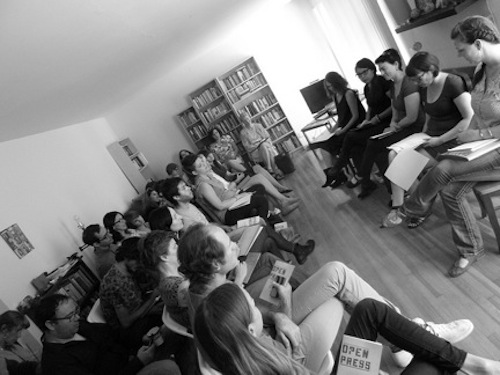
Carrie Hunter (of ypolita) also wanted to talk about technology, especially Facebook. ypolita is a feminist press that largely publishes work by women. ypolita mostly distributes its publications IRL (in real life), meaning that Carrie shares the work in person with people she’s in live-time community with. She asks whether Facebook, as a platform, is gendered to begin with (what parts of the self are lost within its structures, especially since it is a platform designed for consuming, being consumed, performativity, and surveillance), but she also asks whether women latch on to it because it seems like a way of embracing the future—and that women look to the future because the past has rejected us. Social media transforms life into a series of intrusions—these social media technologies feel like they are kinesthetically or temporally intruding or imposing themselves into real life, or rupturing the attentions of the present moment; in turn, real life acts as if it needs to re-assert itself. The normative body is one of split attentions and spatial/temporal negotiations. Carrie also asks, what would a socialist media platform look like?
Here is an excerpt from Carrie’s presentation:
I wanted to talk about time and IRL (In Real Life). I wanted to talk about social media and how to reclaim this former time we used to have of IRL. I wanted to talk about female agency in bay area poetics. I wanted to talk about rape/the raped body as compromised body. I wanted to talk about women’s voices being silenced and how we silence ourselves. I wanted to talk about the spectator body and reclaiming the social body. I wanted to talk about the gender binary. I wanted to talk about how our legibility is compromised and how we compromise our own legibility to survive. I wanted to talk about existing in flux, in between states. I wanted to talk about ways I've made compromises to live in poetry. I wanted to talk about race and our mostly segregated literary communities. I wanted to talk about my writer friends with invisible illnesses. I want to talk about existing in multiplicities vs. linear time/linear work and their relation to fragment and collage. I want to talk about how editing distances you from the body but creates a space for a latter IRL. I want to talk about writing projects and being in flux. I want to talk about being a woman poet & publisher with a feminist press publishing mostly women. I want to talk about how women’s voices are so often compromised voices. How our texts are compromised texts and what they could be if they were not.
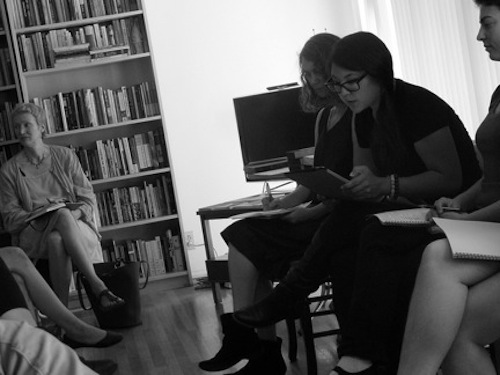
Janice Lee (of Entropy) also talked about time, about how narrative and poetics attempt to render the inexpressible—however, only after the present moment has lapsed can the inexpressible find expression. And yet, this expression is never final—we move only from one threshold to another. She writes:
We all begin with the premise that the color of the sky is blue. But the sky knows how to not fall onto the ground below.
A restless perambulation on the threshold of being. This is the definition of a poem.
When we study a poem, we rewrite its intimacy with a space, the horizonless sky enclosed in language capsules.
Steeper.
Steeper, still.
Gaston Bachelard in The Poetics of Space writes: “The poet speaks on the threshold of being.”
[…]
Morphability of voice.
The very trace in the air.
Increased breath.
Again, that sense of endless wonder.
To step out of the air-conditioned car, into the density of the heat, the burden of silence, here, the retracing of a melancholic achievement, the spectral acoustics of the sea, the localization of memories.
Arm outstretched.
House unfastened.
Dismay.
And hope.
In Janice’s work, there is a “perceived persistence” through time and space. Her text was generated from visits to the Salton Sea, a lake and dry desert basin about 250 miles outside of Los Angeles. The Salton Sea is so polluted and saturated with saline that it is now full of dead fish. Walking there, one can barely handle the stench. However, Janice, finds recourse to hope, to awakening. She writes:
The smell.
In some cases it is possible to smell death, then, to continue being calm, to continue one’s good mood. Foul smells are not always nauseating. They can move into that spectrum of refreshing, that is, to be reminded of what death smells like is to be reminded of how to breathe again.
The sky.
The sky looks different wherever you are.
Stephanie Sauer (of Copilot Press) talked about the disabled body. She grew up in a rural area, and her father had a physical disability. Mountain life is tactile. People are loggers, seamstresses. In a mountain community, having a physical disability becomes more pronounced. She discussed how she’s interested in touch, in the book as a tactile object. Here is a 1985 issue of Playboy written exclusively in Braille:
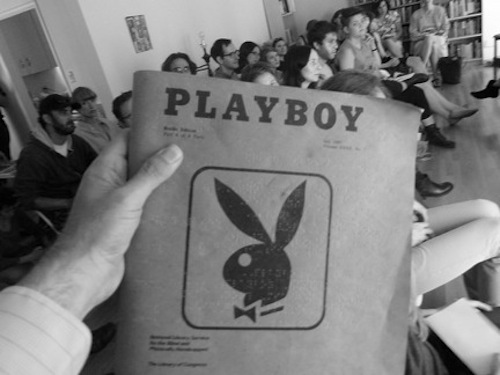
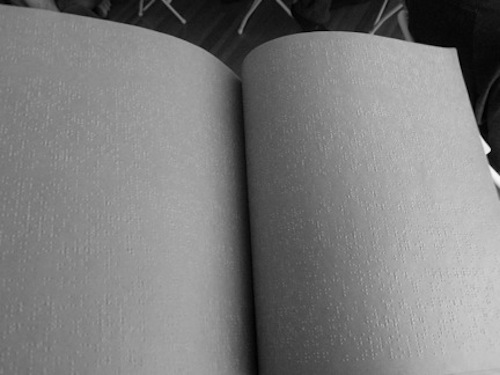
Part of the influence for the press is Stephanie’s five-year-old nephew, who learns and discovers the world by putting objects in his mouth (again, the what goes into our mouths affects what comes out). She wonders how adult books, like children’s books, can engage the senses.
Here is one of Copilot’s books, Dream Memoirs of a Fabulist by Doug Rice. In the book, Doug Rice discusses his female body, photographs himself in a bra. To access the book, one has to undress it. First, by popping the seal. Then by opening the flaps. The book opened, we see the following text: “As soon as I take a photograph, it is something else entirely.” The spine of the book has no text—it is bare. And to emphasize the act of touch, the book is the size of Stephanie’s hand. To close the book is to put its clothes back on.
The book is also fun. Because—“It’s fun to be naked.”
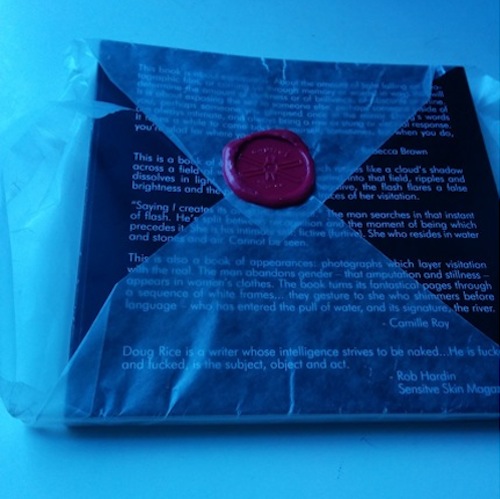
Stephanie also showed us her current writing project: a quilt she is making (I wish I had a picture of it. I don’t. But it was beautiful.). Quilting as narrative allows her to think with her hands, to write-through intergenerational trauma. She has hand-written oral narratives onto the various blocks of fabric. Again, we return to the idea of the body being stitched together, the seams showing. The multi-temporal body, or the singular body made from so many other bodies.
Here we are.
And How is it that our bodies belong to us when it seems that, so much of the time, they don’t?
Writer and teacher Amanda Ackerman earned an MFA at the California Institute of the Arts. Her work blurs the lines between poetry, narrative, and prose. Her engagement with ecopoetics is informed by her longtime work as a flower essence practitioner. In a note on the making of The Book of Feral...
